
The global aviation industry is currently navigating one of its most significant challenges to date, facing mounting pressure to radically decarbonize its operations and achieve ambitious sustainability targets set for 2050. As the world moves towards a greener future, the long-term viability of

The Dated Brent global physical crude oil benchmark, a critical financial instrument that prices over 60% of the world's traded crude and underpins countless futures contracts, is functioning effectively and requires no immediate, significant methodological changes, according to a recent assessment

In a remarkable display of operational agility, Venezuela’s state-run oil company managed to increase its exports in November, defying the crippling effects of a major fire that shut down a critical processing facility. This unexpected performance highlights a sector that has become adept at

With extensive experience in energy management and a deep understanding of grid security, Christopher Hailstone joins us to dissect the complex forces currently shaping global oil markets. We will explore the surprising dominance of macroeconomic sentiment over traditional supply data, delving into

Today we’re speaking with Christopher Hailstone, a leading expert on energy management and grid security, whose work provides critical insights into the complex geopolitics of the global energy market. He brings decades of experience to help us understand the intricate dance of sanctioned oil

A Quiet Revolution in Hungary's Energy Strategy While the Hungarian government publicly vows to fight European Union mandates aimed at phasing out Russian gas, its state-owned energy conglomerate, MVM Group, is meticulously engineering a future where the nation can thrive without it. This emerging